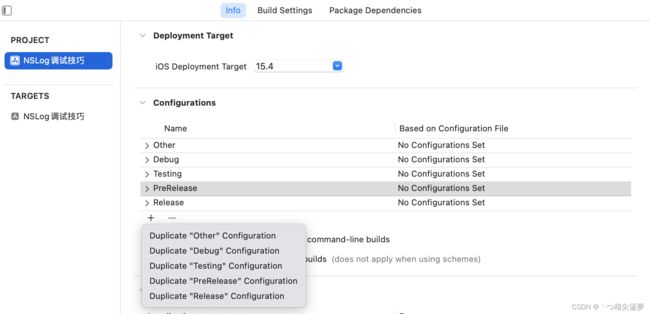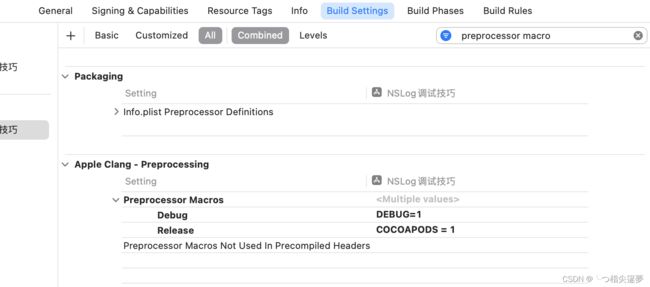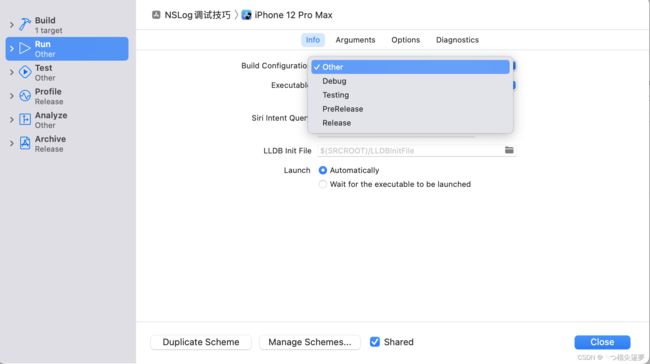一、DEBUG 宏区分调试模式和发布模式进行特殊处理
① 利用 Configuration 配置不同的编译环境
- 一个应用往往对应多个域名的情况,测试地址、生产地址、后台接口开发者的个人主机地址:
1.开发人员环境(Other)连接写服务人的电脑,与服务器联调使用
2.开发环境(Debug)完成需求,代码上传,在外网开发服务器调试
3.测试环境(Testing)测试人员使用
4.预发布(PreRelease)测试人员使用,copy 的正式数据
5.正式环境(Release)上传 AppStore 使用

- 在 Build Setting 中搜索 preprocessor macro:

- 定义预编译宏 Preprocessor Macros:
k_BUILD_VERSION = 0 -> 开发人员环境(Other)
k_BUILD_VERSION = 1 -> 开发环境(Debug)
k_BUILD_VERSION = 2 -> 测试环境(Testing)
k_BUILD_VERSION = 3 -> 预发布环境(PreRelease)
k_BUILD_VERSION = 4 -> 正式环境(Release)

#if (k_BUILD_VERSION == 0)
your code
#elif (k_BUILD_VERSION == 1)
your code
#elif (k_BUILD_VERSION == 2)
your code
#elif (k_BUILD_VERSION == 3)
your code
#elif (k_BUILD_VERSION == 4)
your code
#endif

- 配置不同环境,如果手机装了多个环境的项目,不好区分,可以在 Xcode 配置脚本,在编译时根据不同环境制作不同的 icon 图标。
② 发布模式关闭 NSLog
#ifdef DEBUG
#define NSLog(...) NSLog(__VA_ARGS__)
#define KisDebug 1
#else
#define NSLog(...)
#define KisDebug 0
#endif
二、Objective-C’s boxing capability(“装箱”快速构造数字对象)
① NSLog 的输出
- NSLog 将消息输出到 Apple System Log 工具或 Console 应用程序:
② 改进 Objective-C 中的日志记录
| 宏 |
格式说明符 |
描述 |
| func |
%s |
当前函数签名 |
| LINE |
%d |
在源代码文件的当前行号 |
| FILE |
%s |
源代码文件的完整路径 |
| PRETTY_FUNCTION |
%s |
print the name of the function being called |
NSLog( @"calling: %s", __PRETTY_FUNCTION__ );
| 表达 |
格式说明符 |
描述 |
| NSStringFromSelector(_cmd) |
%@ |
Name of the current selector |
| NSStringFromClass([self class]) |
%@ |
Name of the current object’s class |
| [[NSString stringWithUTF8String:FILE] lastPathComponent] |
%@ |
Name of the source code file(源代码文件的名称) |
| [NSThread callStackSymbols] |
%@ |
NSArray of the current stack trace as programmer |
NSLog(@"%@", [NSThread callStackSymbols]);
| Type |
Format specifier |
Considerations |
| NSInteger |
%ld or %lx |
Cast the value to long |
| NSUInteger |
%lu or %lx |
Cast the value to unsigned long |
| CGFloat |
%f or %g |
%f works for floats and doubles when formatting; but note the technique described below for scanning |
| CFIndex |
%ld or %lx |
The same as NSInteger |
| pointer |
%p or %zx |
%p adds 0x to the beginning of the output. If you don’t want that, use %zx and no typecast |
③ 装箱快速构造数字对象
- NSLog 函数提供许多用于打印数字的替代标记(例如 %d,%ld,%f,%d 等),为了方便起见,可以使用 Objective-C 的装箱功能来节省时间并避免编译器警告:
double myNumber = 8.80;
NSLog(@"number : %@", @(myNumber));
NSLog(@"number class: %@", @(myNumber).class);
number : 8.8
number class: __NSCFNumber
- 平常也可以使用 @ 来快速包装数字类型以对象的形式进行存储和传参:
[discountArray addObject:[[self class] mj_objectWithKeyValues:@{@"placeholder":QCTLocal(@"please_input_card_num"),@"btnContent":QCTLocal(@"member_see"),@"EnterModelType":@2,@"isEnabled":@1,@"isLast":@1,@"block":block}]];
④ 打印调试(强化 NSLog)
#define NSLog(format, ...) do { \
fprintf(stderr, "<%s : %d> %s\n", \
[[[NSString stringWithUTF8String:__FILE__] lastPathComponent] UTF8String], \
__LINE__, __func__); \
(NSLog)((format), ##__VA_ARGS__); \
fprintf(stderr, "-------\n"); \
} while (0)
<ViewController.m : 32> -[ViewController viewDidLoad]
2022-06-26 17:33:31.022 DEUBG[12852:1238167] Hello World!
-------
三、benchmarking 的时间测量
① benchmarking
- benchmark 是程序明确地要测量并比较硬件以及软件上的运行效率。benchmarking 表示的则是测量效率的一段代码,可结合 Instruments 进行性能分析。
- benchmark 代码不应该被加到终极提交的产品中,Benchmarking 应该被分离到单独的项目分支或独立的测试用例中,或者使用 DEBUG 宏的区分调试模式和发布模式进行特殊处理。
② CACurrentMediaTime
- 推荐使用包装 mach_absolute_time 的 CACurrentMediaTime() 方法来以秒为单位测量时间:
CA_EXTERN CFTimeInterval CACurrentMediaTime (void)
API_AVAILABLE (macos(10.5), ios(2.0));
- 和 NSDate 或 CFAbsoluteTimeGetCurrent()偏移量不同的是,mach_absolute_time() 和 CACurrentMediaTime() 是基于内建时钟的,能够更精确更原子化地测量,并且不会因为外部时间变化而变化(例如时区变化、夏时制、秒突变)。
static size_t const count = 1000;
static size_t const iterations = 10000;
CFTimeInterval startTime = CACurrentMediaTime();
{
for (size_t i = 0; i < iterations; i++) {
@autoreleasepool {
NSMutableArray *mutableArray = [NSMutableArray array];
for (size_t j = 0; j < count; j++) {
[mutableArray addObject:object];
}
}
}
}
CFTimeInterval endTime = CACurrentMediaTime();
NSLog(@"Total Runtime: %g s", endTime - startTime);
③ dispatch_benchmark
- dispatch_benchmark 函数返回给定块执行所需的平均纳秒数:
extern uint64_t dispatch_benchmark(size_t count, void (^block)(void));
static size_t const count = 1000;
uint64_t t = dispatch_benchmark(iterations, ^{
@autoreleasepool {
NSMutableArray *mutableArray = [NSMutableArray array];
for (size_t i = 0; i < count; i++) {
[mutableArray addObject:object];
}
}
});
NSLog(@"[[NSMutableArray array] addObject:] Avg. Runtime: %llu ns", t);



